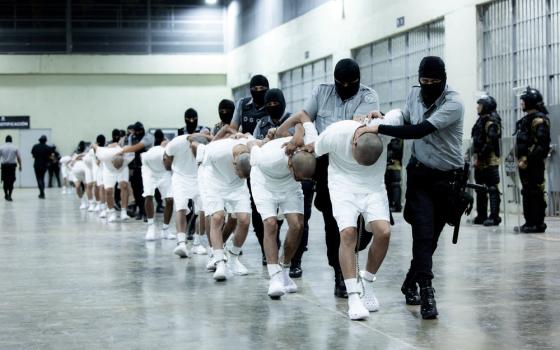By JOHN L. ALLEN JR.
New York
Advocating a “true integral humanism,” Pope Benedict XVI today insisted that defense of the right to life on issues such as abortion and euthanasia is inextricably linked to peaceful resolution of global conflicts such as the recent crisis in Lebanon, or the “scourge of terrorism.”
The common thread, the pope argued, is respect for the natural moral law, as opposed to a “relativistic” conception of rights which, Benedict argued, can lead to weakening or abandoning those rights, thus making violence possible.
The pope’s comments came in his annual message for the World Day of Peace, released this morning in a Vatican news conference. The Vatican marks the “Day of Peace” each year on January 1, a date selected by Pope Paul VI on the grounds that as the beginning of the New Year, it carries universal, rather than specifically religious, significance.
Perhaps unsurprisingly for a pope who memorably defined a “dictatorship of relativism” as the central crisis facing the church, Benedict warned against superficially tolerant positions, such as a "relativistic conception of the person," which, he believes, turn out to be profoundly dangerous.
“Many of our contemporaries actually deny the existence of a specific human nature and thus open the door to the most extravagant interpretations of what essentially constitutes a human being,” the pope wrote.
“A ‘weak’ vision of the person, which would leave room for every conception, even the most bizarre, only apparently favors peace,” Benedict wrote. “In reality, it hinders authentic dialogue and opens the way to authoritarian impositions, ultimately leaving the person defenceless and, as a result, easy prey to oppression and violence."
Benedict argued that natural law, and the presupposition of objective truth which underlies it, provides the basis for real dialogue across cultures about peace. He quoted in this regard the Indian sage Mahatma Gandhi: “The Ganges of rights flows from the Himalaya of duties.”
Picking up a theme from his Sept. 12 address at the University of Regensburg, which set off waves of protest in the Muslim world because of the impression that the pope had linked Islam with violence, Benedict again insisted upon the centrality of reason in efforts to build a culture of peace. It is reason, he wrote, which opens the mind to the natural law.
“The norms of the natural law should not be viewed as externally imposed decrees, as restraints upon human freedom,” he wrote. “Rather, they should be welcomed as a call to carry out faithfully the universal divine plan inscribed in the nature of human beings.”
Although it has become customary in Catholicism for “pro-life” and “peace and justice” activists often to move in different circles, Benedict insisted that the two causes are inseparable.
“Abortion and embryonic experimentation constitute a direct denial of that attitude of acceptance of others which is indispensable for establishing lasting relationships of peace,” the pope wrote.
Along with the right to life, Benedict also identified the right to religious freedom as a core concern.
“Speaking of Christians in particular … in some States they are actually persecuted, and even recently tragic cases of ferocious violence have been recorded,” the pope wrote.
The pope also addressed discrimination against women.
“I think of the exploitation of women who are treated as objects, and of the many ways that a lack of respect is shown for their dignity,” the pope wrote. “I also think —in a different context—of the mindset persisting in some cultures, where women are still firmly subordinated to the arbitrary decisions of men, with grave consequences for their personal dignity and for the exercise of their fundamental freedoms.”
In another section of his message, Benedict argued that environmental concern and peace-making are naturally related.
“Experience shows that disregard for the environment always harms human coexistence, and vice versa,” he wrote. In this context, Benedict warned of an increasingly serious problem of energy supplies, especially for developing nations.
Benedict also said that terrorism demands new reflection on the moral dimensions of war.
“War always represents a failure for the international community and a grave loss for humanity,” the pope wrote. “When, despite every effort, war does break out, at least the essential principles of humanity and the basic values of all civil coexistence must be safeguarded; norms of conduct must be established that limit the damage as far as possible and help to alleviate the suffering of civilians and of all the victims of conflicts.”
Perhaps referring to recent debates surrounding Iran, the pope also condemned “the desire shown by some states to acquire nuclear weapons.”
In a comment that American Catholics may hear in light of the recent sexual abuse crisis, Benedict XVI opened his message with a reference to the protection of children.
The pope said his message was motivated in part “out of concern for children, especially those whose future is compromised by exploitation and the malice of unscrupulous adults.”




